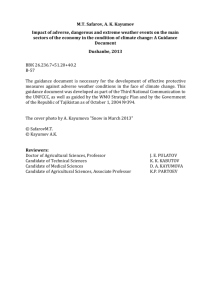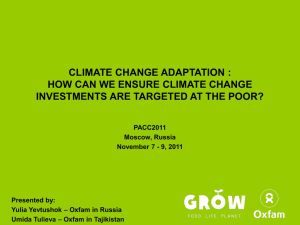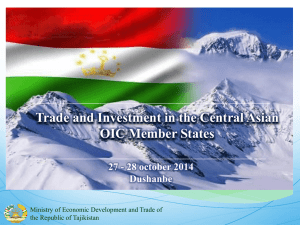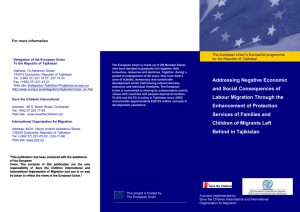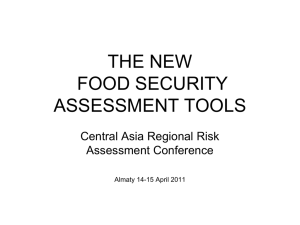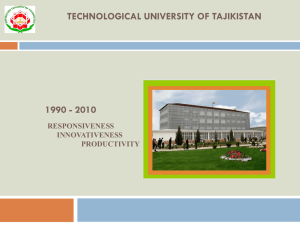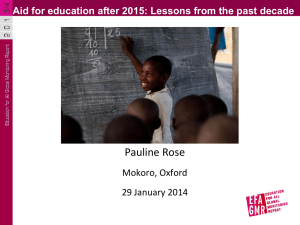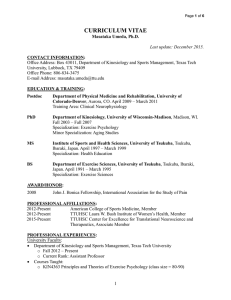Ms. Laylee Moshiri. UNICEF Representative in Tajikistan
advertisement
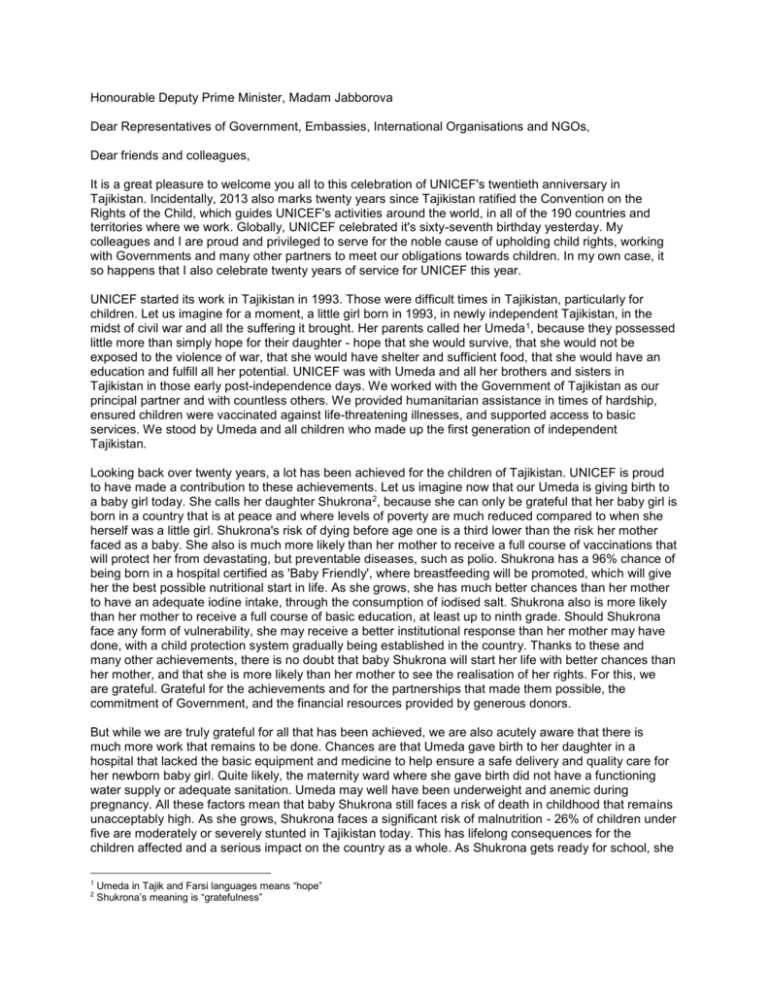
Honourable Deputy Prime Minister, Madam Jabborova Dear Representatives of Government, Embassies, International Organisations and NGOs, Dear friends and colleagues, It is a great pleasure to welcome you all to this celebration of UNICEF's twentieth anniversary in Tajikistan. Incidentally, 2013 also marks twenty years since Tajikistan ratified the Convention on the Rights of the Child, which guides UNICEF's activities around the world, in all of the 190 countries and territories where we work. Globally, UNICEF celebrated it's sixty-seventh birthday yesterday. My colleagues and I are proud and privileged to serve for the noble cause of upholding child rights, working with Governments and many other partners to meet our obligations towards children. In my own case, it so happens that I also celebrate twenty years of service for UNICEF this year. UNICEF started its work in Tajikistan in 1993. Those were difficult times in Tajikistan, particularly for children. Let us imagine for a moment, a little girl born in 1993, in newly independent Tajikistan, in the midst of civil war and all the suffering it brought. Her parents called her Umeda 1, because they possessed little more than simply hope for their daughter - hope that she would survive, that she would not be exposed to the violence of war, that she would have shelter and sufficient food, that she would have an education and fulfill all her potential. UNICEF was with Umeda and all her brothers and sisters in Tajikistan in those early post-independence days. We worked with the Government of Tajikistan as our principal partner and with countless others. We provided humanitarian assistance in times of hardship, ensured children were vaccinated against life-threatening illnesses, and supported access to basic services. We stood by Umeda and all children who made up the first generation of independent Tajikistan. Looking back over twenty years, a lot has been achieved for the children of Tajikistan. UNICEF is proud to have made a contribution to these achievements. Let us imagine now that our Umeda is giving birth to a baby girl today. She calls her daughter Shukrona 2, because she can only be grateful that her baby girl is born in a country that is at peace and where levels of poverty are much reduced compared to when she herself was a little girl. Shukrona's risk of dying before age one is a third lower than the risk her mother faced as a baby. She also is much more likely than her mother to receive a full course of vaccinations that will protect her from devastating, but preventable diseases, such as polio. Shukrona has a 96% chance of being born in a hospital certified as 'Baby Friendly', where breastfeeding will be promoted, which will give her the best possible nutritional start in life. As she grows, she has much better chances than her mother to have an adequate iodine intake, through the consumption of iodised salt. Shukrona also is more likely than her mother to receive a full course of basic education, at least up to ninth grade. Should Shukrona face any form of vulnerability, she may receive a better institutional response than her mother may have done, with a child protection system gradually being established in the country. Thanks to these and many other achievements, there is no doubt that baby Shukrona will start her life with better chances than her mother, and that she is more likely than her mother to see the realisation of her rights. For this, we are grateful. Grateful for the achievements and for the partnerships that made them possible, the commitment of Government, and the financial resources provided by generous donors. But while we are truly grateful for all that has been achieved, we are also acutely aware that there is much more work that remains to be done. Chances are that Umeda gave birth to her daughter in a hospital that lacked the basic equipment and medicine to help ensure a safe delivery and quality care for her newborn baby girl. Quite likely, the maternity ward where she gave birth did not have a functioning water supply or adequate sanitation. Umeda may well have been underweight and anemic during pregnancy. All these factors mean that baby Shukrona still faces a risk of death in childhood that remains unacceptably high. As she grows, Shukrona faces a significant risk of malnutrition - 26% of children under five are moderately or severely stunted in Tajikistan today. This has lifelong consequences for the children affected and a serious impact on the country as a whole. As Shukrona gets ready for school, she 1 2 Umeda in Tajik and Farsi languages means “hope” Shukrona’s meaning is “gratefulness” still only has a one in ten chance of accessing pre-school education that will give her a solid foundation for her academic career. Low-cost models of early childhood education have been demonstrated by UNICEF and others, but coverage remains low and needs rapid scaling up. Shukrona also still quite unlikely to progress much beyond the compulsory cycle of education. The gender gap in tertiary education in Tajikistan is amongst the highest in the world, thus harming girls' chances to fully participate in the country's economy and society. As a girl and as a woman, Shukrona is rather too likely to encounter violence. Almost one in five women in Tajikistan report having experienced physical violence since age 15 and more than one in ten have experienced this in the last twelve months, mostly at the hands of the husband or partner. And finally, should Shukrona have a disability, she is presently unlikely to access the services and benefits she needs, will probably not find a place in a regular school, and may well face stigma and discrimination throughout her life. There is much to be thankful for, but there is also much that remains to be done. UNICEF will stand by Shukrona and her brothers and sisters that make up the second generation of Tajikistan, just like we stood by her mother Umeda over the past two decades. We will do so in close partnership with The Government of Tajikistan, with civil society, with development partners, and with all who are committed to the realisation of child rights. Many of the challenges that baby Shukrona faces today have tried and tested, affordable solutions. Take the nutritional situation of children, for example. Cost-effictive measure such as the promotion of appropriate infant and young child feeding, universal salt iodisation, micronutrient supplementation and management of severe and acute malnutrition could do away with the bulk of the malnutrition burden for children under five. Let us join hands to ensure that Shukrona not only benefits from the achievements of the past, but that we keep improving her chances and those of all boys in girls in Tajikistan. Let us fast-forward now to the year 2033, twenty years from now. Some of us will not be here by that time, but perhaps it will be the year that baby Shukrona gives birth to her own baby girl and Umeda becomes a grandmother. We hope that Shukrona will have reason to call her baby Dilafruz 3, because her heart will be filled with a bright glow, secure in the knowledge that she is born into a society that will ensure that she can grow to her full potential, irrespective of her sex, her ethnicity, her social background or her disability status. A society that respects her rights to the fullest extent. This is our dream for the future, third generation of independent Tajikistan. The best present you can give us today, as we celebrate our twentieth anniversary, is your personal commitment to unite for the realisation of the rights of every boy and girl in Tajikistan. Together, we stood by Umeda. Together, we will stand by Shukrona. And together we will build a society that makes our dreams for Dilafruz come true. The preparations for the UNICEF@40 celebration start today. And we need you all to ensure that we will have countless genuine reasons to celebrate. The realisation of the rights of every child is within reach of our generation. Let's not disappoint ourselves or our children. 3 Dilafruz means “a heart illuminator”
